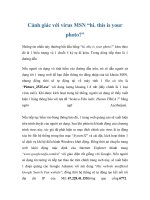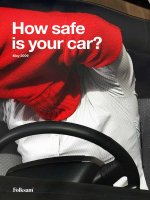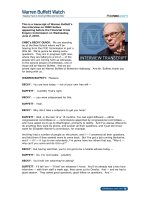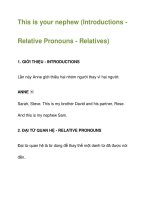This Is Your Brain on Parasites: How Tiny Creatures Manipulate Our Behavior and Shape Society
Bạn đang xem bản rút gọn của tài liệu. Xem và tải ngay bản đầy đủ của tài liệu tại đây (5.92 MB, 280 trang )
Contents
TitlePage
Contents
Copyright
Dedication
Introduction
BeforeParasitesWereCool
HitchingaRide
Zombified
Hypnotized
DangerousLiaisons
GutFeelings
MyMicrobesMadeMeFat
HealingInstinct
Photos
TheForgottenEmotion
ParasitesandPrejudice
ParasitesandPiety
TheGeographyofThought
Acknowledgments
Notes
Index
AbouttheAuthor
Copyright©2016byKathleenMcAuliffe
Allrightsreserved
Forinformationaboutpermissiontoreproduceselectionsfromthisbook,write
toortoPermissions,HoughtonMifflinHarcourt
PublishingCompany,3ParkAvenue,19thFloor,NewYork,NewYork10016.
www.hmhco.com
LibraryofCongressCataloging-in-PublicationData
Names:McAuliffe,Kathleen,author.
Title:Thisisyourbrainonparasites:howtinycreaturesmanipulateour
behaviorandshapesociety/KathleenMcAuliffe.
Description:Boston:HoughtonMifflinHarcourt,2016.|“AnEamonDolan
book.”
Identifiers:LCCN2016002949(print)|LCCN2016009925(ebook)|ISBN
9780544192225(hardback)|ISBN9780544193222(ebook)
Subjects:LCSH:Nervoussystem—Diseases.|Parasitology.|Microbiology.|
BISAC:SCIENCE/LifeSciences/Biology/Microbiology.|PSYCHOLOGY/
Psychopathology/Schizophrenia.|MEDICAL/Microbiology.
Classification:LCCRC346.M362016(print)|LCCRC346(ebook)|DDC
612.8—dc23
LCrecordavailableat />
CoverdesignbyMarthaKennedy
eISBN978-0-544-19322-2
v1.0516
Tomyfamily,andinlovingmemoryofmysisterSharon
McAuliffe,averytalentedsciencewriterwhodiedway
tooyoung
INTRODUCTION
W
ELIKETOTHINKofourselvesasinthedriver’sseat,choosingwheretogo,
whethertospeeduporslowdown,whentoswitchlanes.Wemakethedecisions
andbeartheconsequences.Thisisaconvenient,evennecessarybelief.Ifwe
jettisonthenotionoffreewill,thelawsthatholdpeopleaccountablefortheir
actionsbegintocrumble.Theworldbecomesanunrulyoreventerrifyingplace.
Alienbeingsthatturnusintozombies,bloodthirstyvampires,andsex-crazed
robotsarestandardsci-fifarepreciselybecausetheyevokethehorroroflosing
controlor,worse,becomingslavestocreaturesbentonexploitingusfortheir
owngain.Soit’sdisconcertingtothinkthataninvisiblepassengermightalso
haveahandonthesteeringwheel,vyingtomoveusinonedirectionwhenwe’d
rathergoanother.Whenweletupontheaccelerator,anunseenfootpresses
harder.
Parasitesarelikethatinvisiblepassenger.Adeptatoutwittingourimmune
systems,theysneakaboardourbodiesandthenthedevilrybegins.Theycause
rashes,lesions,aches,andpain.Theyeatusfromtheinsideout;useusto
incubatetheiryoung;sapourenergy;blind,poison,maim,andsometimeskill
us.Butthat’snotthefullextentoftheirclout.Someparasiteshaveanothertrick
uptheirsleeves—anawesomehiddenpowerthatastoundsandconfoundseven
scientistswhostudythemforaliving.Simplystated,theseparasitesaremasters
ofmindcontrol.Whetherastinyasavirusorasbigasasix-foot-long
tapeworm,theyhavefoundallkindsofdeviousmethodstomanipulatethe
behavioroftheirhosts,andthatincludes,manyresearchersnowstrongly
suspect,humans.
TheimpetusforthisbookwasadiscoveryontheInternet.I’mascience
journalistandonedaywhileforagingforinterestingtopicstowriteaboutI
stumbledacrossinformationaboutasingle-celledparasitethattargetsthebrains
ofrats.Bytinkeringwiththerodent’sneuralcircuits—exactlyhowisstilla
matteroffervidstudy—theinvadertransformstheanimal’sdeepinnatefearof
catsintoanattraction,thusluringitstraightintothejawsofitschiefpredator.
Thisisafelicitousoutcomenotonlyforthecatbutalso,Iwasstunnedtolearn,
fortheparasite.Itturnsoutthefelinegutisexactlywheretheorganismneedsto
betocompletethenextstageofitsreproductivecycle.
Thisrevelationgotmethinkingaboutmyowncat,whowasfondofdropping
deadrodentsatmyfeet.HorrifiedasIwasbythishabit,Icouldnothelp
admiringherhuntingprowess.NowIwonderedifitwasshewhowassoclever
ortheparasite.
AsIcontinuedreading,moresurprisingnewsgreetedme:Themicroscopic
organismisacommoninhabitantofthehumanbrainbecausecatscantransmitit
touswhenwecomeincontactwiththeirfeces.Perhapstheparasitewas
meddlingwithourbrainstoo,speculatedaStanfordneuroscientistassociated
withtheresearch.Icontactedhimtofindoutwhathemeantandwaspointedin
thedirectionofabiologistinCzechoslovakia.“He’sabitofawildman,”he
warnedme,“butIthinkitwouldbeworthyourwhiletospeaktohim.”Icalled
PragueandoverthespanofanhourwastoldataleasbizarreasanyI’veheard
inmyprofession.Itoccurredtomeonseveraloccasionsthatthepersonatthe
otherendofthelinemightbeakook,butIpushedthosethoughtsasideandkept
listeningbecauseitwasimpossiblenotto.I’masuckerforagreatstoryandthis
onehadalltheelementsofafirst-ratemedicalthriller.Itwasbyturnscreepy,
scary,weird,andinspiring.What’smore,iftrue,ithadimportanthealth
ramifications.
Aftertheconversationended,Icalledaroundtootherexpertsonthiscat
parasiteforarealitycheck.Ididthisrathersheepishlyatfirst,outoffearof
soundinggullible.ButonesourceafteranothersaidthattheCzech’sideas,
thoughfarfromproven,deservedseriousscrutiny.Hishumanstudies—andthe
odysseythatledhimdownthatpathofinquiry—becamethebasisofalengthy
articleIwroteforTheAtlanticandaredescribedinachapterhere,alongwithhis
mostup-to-dateresults,soyoucandrawyourownconclusions.(Awordof
caution:Beforeyougettothatsection,pleasedonotpanicandgiveawayapet
cat.AsIwillexplaininmoredetail,therearemuchmoreeffectivewaysto
protectagainsttheinfectionthanpartingwithacherishedcompanion.)
Overthecourseofinvestigatingthetopic,Icameacrossmanyotherstoriesof
parasiticmindcontrol;Ilearnedofparasitesthatforcetheirhoststobetheir
personalbodyguards,babysitters,chauffeurs,servants,andmore.Sometimes
scientistsunderstandhowtheyaccomplishthesefeats;othertimes,they’releft
scratchingtheirheads.Itseemedtomethatneurosurgeonsand
psychopharmacologistscouldlearnalotfromparasites.
OnceIbecameawareoftheirantics,itwashardtolookattheworldoutside
mywindowinthesamewayagain.Behindthescenesofthespectaclewecall
naturalselection,Iwassurprisedtolearn,parasitesareoftendirectingtheaction,
influencingtheoutcomeofthebattlebetweenpredatorandprey.Insightsinto
theirstagecraftgavemearadicallydifferentperspectiveonecology,
evolutionarybiology,andthespreadofmosquito-bornescourgeslikemalaria
anddenguehemorrhagicfever.
Whileparasites’coercivetacticshavemanydisturbingimplicationsfor
humans,thenewsfromthisfrontisnotallbleak.Somemicrobesmayactually
improveourmentalhealth.Andinvaderswithsinisteraimswillhavetocontend
withmuchmorethanourimmunesystems.
Mountingresearchsuggeststhathostshavedevelopedpowerfulpsychological
defensesagainstparasites.Scientistscallthismentalshieldthebehavioral
immunesystem.Experimentsshowthatitkicksintoactioninsituationswhere
thethreatofinfectionishigh,promptingtheorganisminperiltorespondin
prescribedwaystoreduceitsrisk.Asimpleexampleisadogthatreactstobeing
hurtbylickingitswound,thuscoatingtheinjurywithsalivarichinbacteriakillingcompounds.Insmartprimateslikehumans,however,itappearsthatour
behavioraldefenseshavebecometiedtoincreasinglyabstractandsymbolic
waysofthinking.Manyhabitsandtraitsthatseemfarremovedfrompathogens
—suchasourpoliticalbeliefs,sexualattitudes,orintolerancetowardpeople
whobreaksocietaltaboos—mayariseatleastinpartfromasubconsciousdesire
toavoidcontagion.Thereisevenevidencethatthepresenceorabsenceofgerms
inourimmediatesurroundings—indicatedbysuchsignsasarancidodoror
filthylivingconditions—caninfluenceourpersonalities.
Directlyorindirectly,parasitesmanipulatehowwethink,feel,andact.Infact,
ourinteractionwiththemmayshapenotonlythecontoursofourminds,butalso
thecharacteristicsofentiresocieties,perhapsexplainingsomepuzzlingcultural
differencesbetweenpartsoftheworldwherepathogensareanomnipresent
threatandareasthathavedramaticallyloweredthatriskthroughvaccination
programsandimprovedsanitation.Numerouslinesofevidencesuggestthatthe
prevalenceofparasitesinourbroadercommunitiesinfluencesthefoodsweeat,
ourreligiouspractices,whomwechooseasmates,andthegovernmentsthatrule
us.
Thesciencebehindtheseclaimsisstillyoung.Somefindingsarepreliminary
andmaynotholduptoscrutiny.Buttheresearchismassingquicklyandthe
outlinesofanewdisciplineareclearlytakingshape.Thisnewlyemergingfield
hasbeenchristenedneuroparasitology.Butdon’tbedeceivedbythelabel.
Whileneuroscientistsandparasitologistscurrentlydominatethisendeavor,itis
increasinglydrawingininvestigatorsfromfieldsasdiverseaspsychology,
immunology,anthropology,religiousstudies,andpoliticalscience.
Ifpathogens’impactonourlivesisreallysofar-reaching,whyhasittakenus
solongtodiscoverthis?Onelikelyreasonisthat,untilrecently,scientists
underestimatedthesophisticationofparasites.Overmostofthepastcentury,the
complicatedlifecyclesoftheseorganisms,coupledwiththeirpunysizeand
concealmentinsidethebody,madethemexceedinglydifficulttostudy.Largely
outofresearchers’ignorance,parasiteswerepresumedtobebackward,
degenerativelifeforms.Theirinabilitytosurviveasindependent,free-living
creatureswasseizedasproofoftheirprimitivestatus.Theverynotionthathosts
highuptheevolutionaryladdermightbejerkedaroundlikemarionettesbysuch
simpletons—manylackingevenanervoussystem—seemedabsurd.
Untilthetailendofthetwentiethcentury,ourbehavioraldefensesagainst
parasiteswerealsoassumedtoberudimentary.Indeed,thesubtlestofthese
adaptations—manifestedasautomaticthoughtsandfeelings—wereoverlooked
almostentirely,probablybecausetheyoccurattheperipheryofourawareness.
Scientistsarenomorecognizantofsubconsciousimpulsesthantherestofus,so
thissubterraneanrealmappearstohavegoneunchartedsimplybecausenoone
thoughttolookforit.
Eventoday,theintimacyandintricacyofparasite-hostrelationshipstake
manyneuroscientistsandpsychologistsbysurprise.Laymenareoften
dumbfoundedbyhownaturecouldhavegivenrisetoparasiticmanipulationsin
thefirstplace;somestratagemsseemsocleverandcunningthatonlyahumanor
anomniscientgodcouldhavedreamedthemup.Theemergenceofthe
behavioralimmunesysteminparallelwithsuchmanipulationsonlyaddstothe
challengeofcomprehendingtheoriginsoftheseinteractions.Sobeforemoving
ahead,let’sstoptoponderhowevolutiontookthisturn.
Parasitesandhostshavebeencompetingwitheachotherforbillionsofyears.
Thefirstbacteriawereparasitizedbythefirstviruses.Whenlarger,multicellular
lifeformsemerged,thesemicrobesinturncolonizedthem.Meanwhile,parasites
continuedevolvingintoamenagerieofdistinctforms—roundworms,slugs,
mites,leeches,lice,andthelike.Aslifegrewinsizeandcomplexity,natural
selectionfavoredparasitesthatwerethebestatevadinghosts’defenses,and
hostswiththegreatestskillinrepellingtheinvaders.
Today,virtuallyeveryaspectofthehumanbody’sdesignbearswitnesstothis
age-oldstruggle.Ourmostvisibledefenseisourskin,whichprovidesathick
barriertothehordesofmicrobesthatpopulateitssurface.Entrypointsare
especiallyfiercelyguarded:Eyesarebathedintearsthatflushoutintruders.Ears
arelinedwithhairstokeepoutbugs.Thenosehasafiltrationsystemfor
screeningpathogensoutoftheair.Invadersthatmakefurtherinroadswillonly
encounterstifferresistance.Therespiratorytract,forexample,producesmucus
thattrapsencroachers.Asforanymicrobesthatweswallowinourfood,they’ll
likelymeetafierydeathinthecauldronofthestomach,whoseindustrialstrengthacidcouldliterallyburnaholeinyourshoe.Shouldallthesedefenses
bebreached,immunecellswillrushintothebattle.Thisarmyisledbysentries
thatflagtheintruder,andthey’refollowedbywhitecellsthatdevouritandstill
othercellsthatrecordtheenemy’smarkingssothatnewregimenscanswiftlybe
calledupshouldthebodyencounterthesamefoeagain.
Withfirepowerlikethatyou’dthinkhumanswouldalwaysbeonthewinning
side.Butparasiteshavehugeadvantagesoverus.Theirpopulationsizedwarfs
ourownbystaggeringnumbers,andtheirrapidreplicationratesensurethat
therewillalwaysbealuckyfewwithmutationsthatwillgivethemtheupper
hand.Thebattlebetweenhostsandparasitesisanunendingarmsrace.
Inthisintenselycompetitiveenvironment,anyparasitesthatbychancehiton
waystomodifythebehaviorofahostsoastoenhancetheirowntransmission—
perhaps,forexample,bynudgingitaweebitclosertotheparasites’nexthost—
wouldveryswiftlymultiply.Sincehostscan’tevolveasquicklytothwartevery
newtrickparasitesdeployagainstthem,theirbestchanceforsurvivalisto
acquiretraitsthatofferthembroaderprotection.Mutationsthatpromptan
animaltofeelrepelledbycommonsourcesofcontagion—forinstance,murky
greenwater,adungheap,orothermembersofitsflockactingstrangely—might
servethatfunction.Thebeautyofsuchpsychologicaladaptationsisthatthey
shieldagainstnotone,buthundredsoreventhousandsofinfectiousagents.
That’salotofbangforthebuck—anopportunitythatevolutionisunlikelyto
havepassedup.Inhumans,moreover,instinctualresponsesthatprotectagainst
infectionwouldalsobeamplifiedandembellishedthroughlearningandcultural
transmission,furtherleveragingtheirbenefit.It’sagoodbetthat’sexactlywhat
happened.
Thoughlions,bears,sharks,andweapon-wieldinghumansmaypopulateour
nightmares,parasiteshavealwaysbeenourworstenemy.Inmedievaltimes,
one-thirdofEurope’spopulationwasdecimatedbythebubonicplague.Withina
fewcenturiesofColumbus’sarrivalintheNewWorld,95percentofthe
indigenouspopulationoftheAmericashadbeenwipedoutbysmallpox,
measles,influenza,andothergermsbroughtinbyEuropeaninvadersand
colonists.Morepeoplediedinthe1918Spanishfluepidemicthanwerekilledin
thetrenchesofWorldWarI.Malaria,presentlyamongthemostdeadly
infectiousagentsontheplanet,isarguablythegreatestmassmurdererofall
time.Expertsestimatethediseasehaskilledhalfofallpeoplewhohaveroamed
theplanetsincetheStoneAge.Newinsightsintohowparasitesspreadamongus
andthehiddenpowerofourmindsincounteringthistsunami-sizethreatcould
yieldhugebenefits.
Oneisthatitmightsuggestinnovativewaystoblockthedisseminationof
much-dreadedinfectiousagents.Anotherhopeisthatdiscoveriesin
neuroparasitologywillexpandourknowledgeoftherootcausesofmental
disturbancesthatwedon’tnormallyassociatewithparasites,possiblyleadingto
advancesintheirpreventionandtreatment.Thediscipline’sgreatestpromisefor
thenearfuture,however,isitscapacitytoenrichourunderstandingofourselves
andourplaceinnature.Certainly,findingsfromthisfrontierraiseprovocative
questions:Ifpathogenscanfiddlewithourminds,whatdoesthatsayaboutour
responsibilityforourownactions?Arewereallythefreethinkersweimagine
ourselvestobe?Towhatextentdoparasitesdefineouridentity?Howdothey
affectmoralvaluesandculturalnorms?Inthefinalchapterofthisbook,Iwill
attempttosalvagetheconceptoffreewill.Butbewarned:itwilltakequitea
beatinginthemeantime.
1
BeforeParasitesWereCool
I
T’SNOTEASYBEINGaparasite.Sure,yougetafreemeal.Butthelifeofa
moocherstillcomeswithplentyofstresses.Youhavetobeabletoadapttothe
environmentinsideone,two,or,ifyoubelongtoaclassofparasiticworms
knownastrematodes,threedifferenthosts—habitatsthatcanbeasdifferent
fromeachotherastheEarthisfromthemoon.Andgettingfromonetothenext
canbealogisticalnightmare.Imagineyou’reatrematodethatspendspartoflife
insideanantbutcanonlysexuallyreproduceinsidethebileductofasheep.
Antsaren’tonasheep’snormalmenu,sohowdoyoumakeittoyournext
destination?
TheanswertothatquestioniswhatsetJaniceMooreonherlife’spath.In
1971,shewasasenioratRiceUniversityinHoustonsittinginanintroductory
courseonparasitologytaughtbyatitaninthefield,ClarkRead,alankyman
withacommandingpresenceandanoddstyleoflecturing.Hewouldpuffaway
onacigaretteandseeminglyfree-associate,drawingstudentsintohispassion
withfascinatingdetailsaboutdifferentspeciesofparasitesthathepresentedwith
nodiscernibleregardforlogicororder.Buthewasagiftedstorytellerwhocould
evokethelivesofparasitessorichlythatyoucouldalmostpicturewhatitwas
liketobeone.Healsoknewhowtospinagoodmystery,whichwashowhe
ensnaredMoore.
Shecouldn’timaginehowtogetanantintoasheep’smouthinspiteofRead’s
admonishmentto“thinklikeatrematode!”Infact,noonecould,becausethe
solutiontheparasitelituponisabsurdlyimprobable:Itinvadesaregionofthe
ant’sbrainthatcontrolsitslocomotionandmouthparts.Duringtheday,the
infectedinsectbehavesnodifferentlythananyotherant.Butatnight,itdoesnot
returntoitscolony;instead,itclimbstothetopofabladeofgrassandclamps
ontoitwithitsmandibles.There,itdanglesintheair,waitingforagrazingsheep
tocomebyandeatit.Ifthatdoesn’thappenbythenextmorning,however,it
returnstoitscolony.
Whydoesn’titjuststayattachedtotheleaf?askedRead,scanningthe
classroomasifheexpectedhisstudentstodiscernthetrematode’slogic.
Becauseotherwise,hetoldhisraptaudience,theantwillfrytodeathinthe
noondaysun—anundesirableoutcomefortheparasite,whichwillperishwithit.
Soupanddowntheantgoes,nightafternight,untilanunsuspectingsheepeats
theant-ladenbladeofgrass,andtheparasitefinallyendsupinthesheep’sbelly.
Read’stalestunnedMoore.Thetrematodecalledtomindacomic-bookarch
villainwhocontrolsmindswithajoystick,causinglaw-abidingcitizenstorob
banksandcommitothercrimessothevillaincantakeovertheworld.Thereport
ofthetrematode’sastonishingfeatcamefromaGermanstudydoneinthe1950s,
but,thrillingMoore,Readhadjustlearnedofresearchbeingdoneonadifferent
organismthatwasproducingfindingssimilartotheGermans’.
Theprotagonistofthistalewasathorny-headedworm—aparasitewitha
spikyheadandaflaccidbodythatlookslikeafive-toten-millimeterwormshapedsac.Beforeassumingitsadultform,theparasitemustmatureinsidetiny
shrimplikecrustaceansthatliveinpondsorlakesandthatusuallyburrowinto
mudatthefirstsignoftrouble.Forthenextstageoftheworm’sdevelopment,
however,itneedstogetinsidethegutofamallard,beaver,ormuskrat—all
creaturesthatliveonthewater’ssurfaceandfeedonthecrustaceans.To
determinehowthestowawaymanagestojumpship,JohnHolmes,aformer
studentofRead’swhohadbecomeaprofessorattheUniversityofAlberta,and
hisgraduatestudentWilliamBethelbroughtcrustaceansintothelab.Infected
ones,theydiscovered,didexactlywhattheyshouldn’t.Insteadofdiving
downwardwhenagitated,theyshottothesurfaceandskitteredaround,allbut
crying,Lookatme!Ifthatfailedtodrawattention,theyclungtovegetationthat
waterfowlandaquaticmammalslikedtoeat.Some,Moorewasamazedtolearn,
evenattachedthemselvestothewebbedfeetofducksandwerepromptly
swallowed.
Anotherintriguingdetailgrabbedherattention.Occasionally,theCanadian
investigatorsfound,thecrustaceansharboredadifferentspeciesofthornyheadedworm.Wheninfectedwiththisvariety,theirtestsshowed,the
crustaceansalsoswamupwardinresponsetoanydisturbance,butthey
congregatedinwell-litareasfrequentedbyscaup(deep-divingducks)—asit
turnedout,thatparticularparasite’snexthost.
Manyinteractionsbetweenpredatorsandprey,thoughtMoore,werenotwhat
theyappearedtobebutratherwere“rigged”byparasites.Perhapsbiologists,
whocouldn’tseewhatwashappeningoutofview,hadbeenhoodwinked!
What’smore,ifparasiteswerenotjustswingingasledgehammer,directlykilling
andsickeninghosts,butalsobringingilluponthembysubtlychangingtheir
behavior,theecologicalimplicationswereenormous.Itmeantthatthesetiny
organismsweretakinganimalsoutofonehabitatandputtingtheminanother,
withunknowneffectsthatwouldripplethroughthefoodchain.
Whentheclassended,sherusheduptoRead.“ThisiswhatIwanttostudy,”
sheannounced,brimmingwithexcitement.Heapplaudedherdecisionasan
adventurousoneandtheyhatchedaplanforherfuture.You’llneedtogeta
master’sinanimalbehaviorandthenyoushouldgetaPhDinparasitology,he
advised,andshedidexactlythat.
Fourdecadeslater,shelookedbackonthatdaywithamusement.“Iwas
bright-eyed,enthusiastic,andtotallyignorantoftheobstaclesintheway,”she
said,breakingintoadeep-throatedlaughatthethoughtofheryouthful
optimism.Vivacious,withshortwavyhair,MoorestillhasatraceofaTexas
twangandshehasavibrant,confidentstyle.Nowaprofessorofbiologyat
ColoradoStateUniversity,shehasarguablyworkedharderthananyoneelseto
awakenthebiologycommunitytothegame-changingnatureofparasitic
manipulationsandencourageanewgenerationofscientiststotakeupthatcause.
Herpioneeringstudies—and,moreimportant,herwritings—haveshonea
spotlightonthemyriadwaysparasitesbendhoststotheirwillandontheir
subversive,oftenunderappreciatedroleinecology.Predators,inherview,may
notalwaysbethesupremehuntersnaturedocumentariessuggesttheyare.A
significantportionoftheircatchofthedaymaybelow-hangingfruitbrought
withintheirreachcourtesyofparasites.Why,afterall,workhardforameal
whenitwillcometoyou?Perhapsthemosthereticalnotionofthefieldshe
helpedfoundissimplythatoneshouldnotassumeanimalsarealwaysactingof
theirownvolition.Numerouscrustaceans,mollusks,fish,and“literally
truckloadsofinsects,”accordingtoMoore,“arebehavingweirdlybecauseof
parasites.”Mammalslikeourselvesappeartobelesscommonvictimsoftheir
manipulations,butthatbeliefmayderivefromignorance,shecautioned.This
muchshe’scertainof:Anundiscovereduniverseofanimalbehaviorwillyetbe
tracedtoparasites.Theirmeddling,inherview,isjusthardertoproveinsome
speciesthanothers.
Mooreandagrowingcadreoflike-mindedscientistsaremakingprogressin
theirmission,butit’sbeenalonghaul—asthereasonforourfirstmeetinginthe
springof2012underscored.We’dbothtraveledthousandsofmilestoabucolic
cornerofTuscany,Italy,toattendthefirst-everscientificconferencedevoted
solelytoparasiticmanipulations.SponsoredbytheprestigiousJournalof
ExperimentalBiology,thehistoriceventdrewafewdozenresearchersfromall
overtheworld—atributetohowfarthedisciplinehadcomebutalsoan
occasiontoreflectonhowmuchfurtheritwouldhavetogotoattainastature
commensuratewithitsimportance.WhileMoorewasdelightedthattheirwork
wasstartingtomakewavesbeyondtheirtinyspecialty,shewasfrustratedthat
manyscientistsstillfailedtograsphowpervasiveparasiticmanipulationswere
innature.Eveninmanyquartersofbiology“they’reoftenviewedaslittlemore
thancutetricksorone-of-a-kindnovelties,”shecomplained.
Anotherchallengefacingneuroparasitologyissemantic.Definingwhat
exactlyconstitutesamanipulation,shesaid,canbetrickyinitself.Technically,
sheandmostofhercolleaguesconcur,thetermreferstoabehavioraparasite
inducesinitshostthatbenefitstheparasite’stransmissionattheexpenseofthe
host’sreproductivesuccess.Butthatseeminglystraightforwarddefinitioncanbe
surprisinglymurkywhenappliedtotherealworld.Ifacoldgermmakesyou
coughuncontrollably,forexample,isthatyourbodytryingtocleartheinfection
fromyourlungsortheparasiteticklingthebackofyourthroatsothatyou’ll
spreadthegerm?Orconsiderthis:Barnyardhensareprobablymoreinclinedto
eatcricketsinfectedwithparasitesthatdamagetheinsects’muscles,sincethose
cricketsareslowerandthuseasiertocatch.Theparasiteneedstogetintothehen
toreproduce,butisittrulymanipulatingthecricketormerelyhurtingit?By
contrast,fewpeopleonhearingoftheantthatclimbsagrassbladeinresponseto
atrematodeinvadingitsbrainwoulddiscounttheinsect’sbehaviorasamere
sideeffectofillness.Sohowfardoyouexpandthedefinitionofmanipulation?
Mooreadmitsit’snotalwaysaneasycall.Butitamazesherthatevenwhen
theevidenceforabehaviorbeingamanipulationisclearcut,youmightnot
knowitfromthecautionarytoneofmanyresearchers’reports.Afterone
scientist’stalk,sheobserved,“AlmosteverypaperI’vereviewedinthelastyear
hasthesamedisclaimer,almostverbatim:‘Thealterationinthehost’sbehavior
maybeduetoamanipulationbytheparasiteorapathology.’Whenarewegoing
tohavetheconfidencetosaysomethingisnotjustabyproductofdiseasebut
obviouslyamanipulation?”Hercolleaguesnoddedinagreement.
Afterward,Iaskedherwhyresearchersmightbetimidaboutexpressingtheir
views.“Becausereviewersalmostalwaysinsistthatyoustickinthatqualifier”
ortheywon’tacceptitforpublication,shereplied.Ideasthatchallengethestatus
quotendtoberesisted,and“pathology,”shesaid,“isthedefaultexplanation”—
theconservativefallbackposition,evenifit’stheleastlikelypossibility.
Therigideither/orthinkingthattraditional-mindedbiologistsoftenbringto
thetopicalsoranklesMoore.Theconductofparasitesandhostslockedinbattle
cannotalwaysbe“neatlysortedintopiles,”shesaid.Maybeyourcough
representsbothyourbody’sefforttoexpelthegermandtheparasite’s
determinationtospreaditself.Evenenemiescansharethesamegoals.Insisting
thataparasite-inducedbehaviorperfectlyfittheprofileofamanipulationto
warrantscientificinterestisequalfolly,inherview.Toillustrateherpoint,
Moorenotedthatoneofhergraduatestudentshadrecentlyfoundthatdung
beetlesdugshallowerburrowsandate25percentlessdungwhentheybecame
infectedwithroundworms.“That’sofhugeecologicalimportance,”she
emphasized.“Australiaactuallyhadtoimportdungbeetlesbecausetheywereup
totheirearsindung.Here’sabeetlethat’sanecosystemengineerthatisitself
beingengineeredbytheparasite.SowesubmitthistotheJournalofBehavioral
Ecologyandtheeditordoesnotevensenditoutforreview.Hewritesback,
‘Thisisobviouslysimplyacaseofpathology’—asif,inthecontext,iteven
mattered.Itwasexasperating!”
IfMooresometimessoundspiquedaboutpreachingtotheunenlightened,it’s
understandable.Especiallyattheoutsetofhercareer,sheoftenfeltlikealone
wolfhowlinginthewilderness.Herideaswerenotsomuchdisparagedas
ignored.AtthetimeshehadherepiphanyinClarkRead’sclass,manybiologists
turnedtheirnosesupatparasites,deemingthemtooprimitiveandrepugnantto
beworthyofexamination.Birdswithfancyplumageandmajesticmammalslike
elephantsandlionswereconsideredmoreappropriatesubjectsofstudy.Parasites
—insofarastheyreceivedanyattention—werealmostexclusivelythedomainof
veterinariansormedicalresearchersseekingtostemthetideofepidemicslike
malariaandcholera.Fewpeoplewereconcernedabouttheirecologicalimpact,
muchlessthepossibilitythattheycouldbossaroundmoreestimableanimals.
IntothisworldsteppedMoore,ayoungwomanespousingthatveryview.She
wasnotonlyamaverickbutalso—byherownadmission—“hopelesslynaive.”
Aftergettingamaster’sinanimalbehaviorattheUniversityofTexasat
Austin,sheproceededtoJohnsHopkinsUniversityinBaltimoretobeginher
PhDinparasitology,atwhichpointsheassumedshecoulddivestraightintoher
areaofinterest.“Ihadn’tacluehowresearchwasactuallyconducted—that
graduatestudentsdon’tgettosettheirownresearchagendabutratherare
expectedtoworkonwhateveristhepetinterestoftheiradvisor.”Asitturned
out,thatpersonwantedhertothrowherenergyintostudyingthebiochemistryof
tapeworms—atopicthatheldnoappealforher.Compoundingherdifficulty
adjustingtoHopkins,Moorewastheonlyfemalegraduatestudentinthe
departmentandfeltisolatedfromherpeers.Asaresult,shehadlittlesenseof
whatothersperceivedtobeimportantissuesinthefield,whichironicallymay
havehelpedaswellashinderedherdevelopmentasascientist.WhenIasked
Mooreifherignorancemighthavefreedhertothinkoutsidethebox,sheshot
back:“Ididn’tevenknowtherewasabox!”
Shewasamisfitinstillotherways.Scienceisinherentlyreductive;itsethos
istobreakbigproblemsdownintosmallerchunksthatcanbemoreeasily
attacked.ButMoorehasalwaysbeenabig-pictureperson.Sheseesconnections
betweenalmosteverythingshelearnsandlikestosynthesizeinformation.Asan
undergraduatesheagonizedoverchoosingamajor,ultimatelysettlingon
biologyowingtoitsbreadth.Thestudyofeverylivingthingonearthshouldn’t
constrainhertoomuch,shethought.Whenitcametimetodecideonaspecialty
withinthatfield,parasitologyandanimalbehaviorattractedherforsimilar
reasons.“Thisjustseemedlikeaboutthemoststuffyoucouldeverpulltogether,
andIwasinastageoflifewhereIhadn’tacluethatit’salsoextremelydifficult
topullthingstogether,whichiswhytheytendnottobetogether,”shesaid,
againburstingintolaughteratheryoungerself’sgung-ho,climb-any-mountain
mentality.
Hergrandvisionofmanipulativeparasitesreorderingfoodchainswas
thrillingtoentertain,butshehadnonotionofhowtodesignanexperimentto
testthesprawlingconceptsthatcrowdedhermind.Hopkins,whichhadstrong
parasitologyandecologydepartments,hadinitiallyseemedtheperfectplaceto
learnthatskill.ButtoMoore’sdisappointment,thegroupswerenotclosely
connected.“Theyperceivedthemselvestobestudyingverydifferentthings,”she
explained.Becauseshehadnoguidanceastohowtobridgethosedisciplines,
hergoalofplacingparasiticmanipulationsinabroadercontextseemedfar
beyondherreach.
Furtherfrustratingher,wheneversheattemptedtoopenothers’eyestothe
possibilitythatparasitesmightbepuppeteers,shewasnotwarmlyreceived.Ata
seminarabouttheecologyofmarinesnailsintheintertidalzone,sheaskedthe
scientistgivingthelectureifhe’dlookedtoseeiftrematodeswereinthe
mollusks.Infectedsnailstendedtobefoundindifferentplacesthanthosefreeof
theparasite,sheexplained,citingapapershe’djustread.Theresearcherbecame
visiblyupset.Fromhisperspective,healreadyhadhishandsfullcharting
numerousfactorsimpingingonthebehaviorofthesnail—migratingpredators,
shiftingcurrents,dailyfluctuationsintemperatures,andmore—andhereshewas
suggestingthatheshouldattendtoyetsomethingelse.Moorewasnot
unsympathetictohisview—studyingparasitesinthefieldremainsadaunting
tasktothisday—butatthetime,hisreactioncameasaheavyblow.
Unabletoseeawayforward,MooredecidedtodropoutofHopkinsattheend
ofherfirstyear.TheChristmasprior,whilebackinTexas,she’dmadeplansto
connectupwithRead,herformerprofessor,who’dalreadyindicatedhemightbe
willingtoletherstudyparasiticmanipulatorsunderhissupervision.Butshortly
beforetheyweresupposedtomeet,hediedunexpectedlyofaheartattack,
leavingMooresaddenedandacademicallyadrift.Shemadenumerousinquiries
atotheruniversitiesinsearchofaPhDprogramthatmightofferhera
comparableopportunity,butneuroparasitologywasnotevenagleamina
scientist’seyeatthattime.EvenJohnHolmes,theCanadianscientistwhoselab
showedthatsomecrustaceanswereactingatthebehestofparasites,wasnot
activelypursuingthatlineofstudy.Itwasasideinterest,heexplained.Moore
hadhitadeadend.
Withnogoodoptions,shetookajobattheUniversityofWashingtonasalab
technicianforanentomologistwhoseinterestsdidnotoverlapwithherown.But
herluckwasabouttochange.Thescientist,LynnRiddiford,wasararityofthat
era,awomanwhohadrisentothetopofherprofession,andsheprovedtobea
greatrolemodel.Atherside,Moorelearnedhowresearchprojectswere
conceived,funded,andcarriedout—essentially,thenutsandboltsofbeinga
successfulscientist.Shecameawayfromtheexperienceempoweredandwith
newconfidenceinherideas.Perhapsbecauseshetookherselfmoreseriously,
otherpeopledidtoo.Afterathree-yeardetour,Moorewasofferedaplaceatthe
UniversityofNewMexicoinauniquePhDprogramthatprovidedfundingfor
studentstodesigntheirownresearchprojects.
Itwasabigopportunityandshedidn’twanttoblowit.Bythensheknewthat
shewouldn’tbeabletoconnectallthedots,thatitwouldbeatriumphsimplyto
identifyanyparasiticmanipulationnotyetrecognized,especiallyifshecould
showthosemanipulationsmadethehostsmoreappealingtotheirpredators
underfieldconditions.FromRiddiford,she’dalsolearnedtheimportanceof
designingatightexperiment,ideallyonewithasimplepremisethatwaseasyto
execute.Aftersearchingthroughacademicpapersandtextbooksformostofa
semester,shefinallybelievedshe’dfoundtheidealsubjectsforherstudy.The
parasitewasatypeofthorny-headedwormthatcycledbetweentwoexceedingly
commonandeasy-to-observehosts,starlingsandpillbugs(orroly-polies,as
childrenoftencallthem,owingtotheirtendencytocurlupintoballswhen
touched).Withonlyafewhunchestogoby,Mooretheorizedthattheparasite
wouldmakethepillbugbehaveinwaysthatwouldincreasetheinsect’s
likelihoodofbeingeatenbyastarling.
Herexperimentalapparatusconsistedofaglasspieplatewithnylonmesh
stretchedacrossmostofthetopandaninvertedpieplateforitscover.She
placedamixtureofinfectedanduninfectedpillbugsontopofthemeshandthen
introducedadifferenttypeofsaltoneachsideofthedivider,creatingone
chamberwithlowhumidityandonewithhigh.Pillbugsthatharboredthe
parasite,shediscovered,weremuchmorelikelytogravitatetowardthelowhumidityzone.Inthewild,dryareascoincidewithexposedlocations,soshe
assumedthebehavioroftheinfectedpillbugswouldmakethemmorevulnerable
topredation.Inanotherexperiment,shebuiltashelterbyplacingatileontopof
fourstones,oneateachcorner.Infectedpillbugspreferredtobeoutintheopen
morethanuninfectedonesdid.Inyetanotherexperiment,shecoveredonehalf
ofapieplatewithblackgravelandtheotherwithwhitegraveltotestwhether
theparasiteaffectedthehost’sabilitytocamouflageitself.Becausepillbugsare
black,shetheorizedthatinfectedoneswouldbemorelikelytohangoutonthe
whitegravel,wherethey’dbeconspicuoustobirds.Indeed,that’sexactlywhat
shefound.
She’dprovenherthesisinthelab,butwouldherfindingsholdupinthefield?
Owingtothedifficultyofstudyingparasitesintheirnaturalhabitat,noscientist
hadbeenabletomeasuretheecologicalimpactofamanipulation.ButMoore
hadacleverplantodojustthat.Shesetupnestboxesforstarlingsonthe
campusduringbreedingseason.Shetiedpipecleanersaroundthethroatsof
starlingnestlings,justtightenoughtopreventthemfromswallowingbutloose
enoughnottohurtthem.Thenshecollectedthepreythattheirparentsfedthem
andproceededtodissectanypillbugsamongtheday’scapture.Shefoundthat
almostone-thirdofstarlingbabieshadbeenfedinfectedpillbugs,eventhough
lessthan0.5percentofpillbugsinthevicinityofthenestboxesharboredthe
parasite.Clearly,thechangestheparasiteinducedinthehabitsofitshostshad
madethemfarmoreattractiveprey.
Oneortwoexamplesofparasiteswithremarkablemanipulativepowerscan
easilybebrushedasideasbizarreaberrations—intriguing,tobesure,buthardly
morethanafootnotetoourunderstandingofnaturalselection.Butmore
examplesbegintolooklikeatrend.WhenMoore’sresultsappearedinthe
journalEcologyin1983,theyattractedattentionnotonlyforthatreasonbutalso
becauseofabroaderdevelopmentsweepingbiology.Afterlongbeingshunned
asdisgustinglowlifes,parasiteswerestartingtobeembracedasobjectsof
fascinationandevenadmiration.AsMooreputit,“Theybecamecool.”
Justwhythishappenedisn’tclear—science,likeallfields,issubjecttofads—
butcoincidingwithherstarlingstudies,aflurryofpaperspointingoutthe
ecologicalimportanceofparasitesbeganappearinginscientificjournals,and
theywerepennedbygiantsinevolutionarybiologylikeRobertMay,Roy
Anderson,andPeterPrice.Aroundthesametime,anotherprominent
evolutionarybiologist,RichardDawkins,publishedapopularbook,The
ExtendedPhenotype,thattouchedmorecloselyonthethemeofparasitic
manipulation.Inthebookhearguedthatwhetherageneispasseddowndepends
notjustonhowitaffectsthecharacteristics,orphenotype,ofthebodyinwhich
itresidesbutalsoonitsimpactonotheranimals.Inthatcategory,hecitedasone
examplenaturalselectionfavoringparasitesthatchangeahost’sbehaviorto
propagatetheirowngenes.
Parasites’suddenriseinpopularityworkedinMoore’sfavor.Editorsat
ScientificAmerican,amagazinewithareputationforpresentingcutting-edge
research,invitedhertowriteanoverviewarticlethatwouldplaceherpillbug
findingsinalargerframework.InadditiontohighlightingtheGermanand
Canadianstudies,shecombedthescientificliteratureforothernoteworthycases
ofparasiticmanipulationsthathadbeenignoredoroverlookedandthen
explainedtheirsignificanceinlively,accessibleprose.
“Oneofthemostfamiliarliterarydevicesinsciencefictionisalienparasites
thatinvadeahumanhost,forcinghimtodotheirbiddingastheymultiplyand
spreadtootherhaplessearthlings,”shebeganthearticleintheMay1984issue
ofthepublication.“Yetthenotionthataparasitecanalterthebehaviorof
anotherorganismisnotmerefiction.Thephenomenonisnotevenrare.One
needonlylookinalake,fieldoraforesttofindit.”
Soonthemanipulationhypothesis,asitbecameknown,wasbeingdiscussed
withgreatinterestinscientificcircles.AsLouisPasteurfamouslyremarked,
“Chancefavorsthepreparedmind.”Oncewordspreadthatparasitesmightbe
dictatorsindisguise,morepeoplebegantonoticeanimalsbehavingstrangely,
andinquiringmindswonderedwhetherinfectiousorganismsmightbetoblame.
Despitescientists’excitementabouttheidea,however,thefield’spopularity
provedfleeting.Thepracticalchallengesofdoingtheresearchquicklydimmed
enthusiasmforit.Observinganimalbehaviorisanarduousundertakingeven
beforeparasitesenterthepicture.Itcanentailspendingendlesshourssubmerged
underwaterinscubagear,hangingfromaharnessatthetopofaforestcanopy,
orsearchingthroughswamplandwithaflashlightinthemiddleofthenight.
Sinceaparasitemayhavetwoorthreehosts,justworkingoutthedetailsofits
lifecyclecanbeaHerculeantask.Toaddtothechallenge,estimatinginfection
ratesineachpopulationusuallymeanscatchingdozensorhundredsofpotential
hostsandeitherdrawingbloodfromtheanimals,collectingtheirfeces,orkilling
anddissectingthem.Then—assumingyouclearallthosehurdles—comesthe
reallyhardpart:determiningwhetherthehitchhikeractuallyismanipulatingthe
hostand,ifso,howandforwhatpurpose.That’sbestdoneinthelab,butmany
animalsaren’tinclinedtogoabouttheireverydayactivitiesincaptivity.Humans
maybemorecooperativesubjects,butscientistswhosuspectthatmentalillness
orotheraberrantbehaviormightbelinkedtoparasiteshitanevenbigger
obstacle:theycan’tinfectpeoplewiththeirbugofchoiceandthenwatchtosee
ifthesubjects’habitsordispositionschange.
Notsurprisingly,researcherswiththepatienceandperseverancetopursue
suchworkarehardtofind,whichiswhyeventodaythere’satendencytofocus
ontheinterplayofpredatorandpreyandignorethehiddenpassengerthatmight
haveaverydifferentagendathanthevehicleit’sridinginside.Nonetheless,by
theturnofthemillennium,scientistshadsucceededinuncoveringseveraldozen
parasiticmanipulationsaffectinghostsacrossvirtuallyeverybranchofthe
animalkingdom.Alwaysthesynthesizer,Moorein2002compiledallknown
casesintoabook,ParasitesandtheBehaviorofAnimals,stillviewedasabible
inthefield.Hergoalinwritingitwastoinspirecreativethinkingabouthow
parasitesworktheirblackmagicandtouncoverunifyingprinciples.Howoften,
shetriedtodetermine,dotheytargetthecentralnervoussystemofthehost?Do
closelyrelatedspeciesemploysimilarcoercivestrategies?Couldverycomplex
manipulationshavesimpleunderpinnings?Aboveall,herruminationsfocused
onaquestionthathadcaptivatedhersinceshewasastudentinClarkRead’s
class:Canyoupredictthebehaviorofanimalsbytheparasitesinsidethem?
Mooreisstilltryingtoanswerthosequestions.Patternsareemerging,but
detailsremainsketchy,sheadmits.Andthetaskathandkeepsgettingbigger.
Hundredsmoreparasitesarenowsuspectedofbeingmanipulators,andthetrue
number,shespeculates,maybeinthethousands.“Wejusthaven’tbumbled
acrossthem,”shesaid.Andnotjustbecauseofthedifficultyofstudyinganimal
behaviororthetabooagainstexperimentingonhumans.Perhapsourbiggest
handicapisthatwe’reimprisonedbyoursenses.Quitesimply,werelytoo
heavilyonoureyesforourunderstandingoftheworld.InthetalkMooregaveat
theconference,sheemphasizedthatpointbyrecountingthestoryofthe
discoveryofbatecholocation.
Sincetheeighteenthcentury,investigatorshaveknownthatblindfoldedbats
candeftlynavigatebetweensilkwiresbutbatswhoseearsaresealedcrashtothe
ground.Yetforoverahundredandfiftyyears,scientistsrefusedtobelievethat
theanimalscouldhearwhathumanscouldnot.Intheearly1940s,advancesin
detectingsoundsintheultrasonicrangedemonstratedthatbatscouldhearthe
echooftheirowncries.Yetthenotionthattheymightusethatskilltonavigate
wasstillnotfullyaccepteduntilthemilitarydeclassifieddocumentsafterWorld
WarIIrevealingthedevelopmentofradarandsonar.
Withthatinmind,saidMoore,it’sworthnotingthatmostofthe
manipulationsweknowoftodaycanbeviewedwiththenakedeye.The
intermediatehostpositionsitselfagainstahigh-contrastbackground,ormoves
aroundfrenetically,orissomeplacewhereitwouldn’tordinarilygo.Because
thisattractshumanattention,wecanreadilyunderstandwhyitwouldbenoticed
byapredatorthatistheparasite’snexthost.Butwhatifaparasiteeffectively
putsatargetonananimal’sbackbyalteringaspectsofitsbehaviorthatare
invisibletooursenses?Perhaps,forexample,itinducesitshosttolaydowna
scenttrailthatournosescan’tsmell,orcausesittoemitsoundsbeyondour
hearingrange,orpromptsittoexposebodypartsthatlookdrablycoloredtous
butarevividtotheparasite’snexthost.Thatmarkedanimalinvitingpredation
mayevenbeoneofus.Asweshalllatersee,someparasitesthatcauseterrible
scourgesarenowsuspectedofenhancingtheirtransmissionbyalteringhuman
bodyodor.“Giventhesepossibilities,”saidMoore,“howcanwefailtowonder
whatmanipulationswearemissinginthiswildworldofinformationthatlies
justbeyondoursenses?”
Acolleaguewhosteppeduptothepodiumimmediatelyafterher,biologist
RobertPoulinfromtheUniversityofOtagoinNewZealand,agreedthat
scientistsweremissingthousandsofmanipulationsbut,interestingly,presenteda
reasondifferentfromanyshe’dproposed.Manymanipulators,hepointedout,
maycausemerelythetiniestshiftsinahost’snormalhabits—somethingthat
couldbeoverlookedwhenscientistscomparetheaveragebehaviorofahost
populationtotheuninfectedgroup.Forexample,parasitesmayslightlymodify
howoftenanimalsgooneplaceoranother,alterthetimeofdaythey’remost
active,orprompthoststoactinanordinarymannerbutinthewrongcontext—
aninfectedbirdpecksthegroundwhiletherestoftheflocktakeswing,for
instance.“Predatorsarehighlyattunedtoanythingthatmakespreystandoutin
theleastway”sothisstrategywouldlikelybehighlyeffective,hesuggested.
Also,thiskindofminortweakshouldnotbeadifficultonetopulloff,hence
evolutionmighthavefavoredthissimplegambit.Whatthisimpliesforhumans
isthatwemayneedtostudybehaviorwithafiner-toothcombtodetectparasites’
influenceonus—forexample,attemptingtolinksuspectedmeddlersnotjustto
flagrantmentalillnessbutalsotomoresubtleshiftsinpersonalityandhabitsthat
arewellwithinhumannorms.
Fortunately,it’snoweasiertotestthesekindsoftheoriesandgetanswersto
someofthebigquestionsposedbythescience.Asthediscoveryofbat
echolocationdemonstrates,itoftentakestechnologicaladvancesbeforenew
frontierscanbebroached,and,hearteninginthatregard,scienceisfinally
startingtocatchupwiththesophisticationofparasites.Overthepastdecade,the
toolsforgettingatthemechanismsbehindmanipulationshaveadvanced
dramatically.Asaresult,researchershavefarbettermethodsforimaging
parasiteswithinthehost’sbodyandforidentifyingthegenes,neurotransmitters,
hormones,andimmunecellsinvolvedinthesebehavioralchanges.Thereare
fewmanipulationsthathavebeenworkedoutintheirentirety,but,asthenext
fewchapterswillreveal,scientistsnowhavesomeexcellentclues.That’sgreat
news,forifweareto“thinklikeatrematode,”wewillneedtounderstandits
tricks.
2
HitchingaRide
T
HEANECDOTALREPORTSWEREWILD.Cricketsthatnormallyinhabitedtheforest
flooranddidn’tswimwereleapingheadfirstintopondsandstreams.Frédéric
Thomassuspectedthatawormseenwrigglingoutoftheinsect’sbodyasit
drownedwasbehindthecricket’ssuicidalimpulse,buttheonlywaytobesure
wastogotoNewZealand,wherethephenomenonhadbeenreported.In1996,
Thomas,anevolutionarybiologistattheUniversityofMontpellierinFrance,
appliedtotheFrenchgovernmentformoneytoinvestigatethematter,confident
hisproposalwouldbefunded.Thoughhe’donlyjustgottenhisPhD,healready
hadfourteenscientificpublicationstohisname—aprodigiousnumberforsucha
youngscientist—soheassumedhe’dbeashoo-inforagrant.What’smore,an
animalactingsoflagrantlyagainstitsownbestinterestswasclearlyatopic
worthyofstudy—orsohethought.Stunninghim,theCentreNationaldela
RechercheScientifique(CNRS)—France’sequivalentoftheUnitedStates’
NationalScienceFoundation—turneddowntheproposal.Hewassoangeredby
theirdecision,hetoldme,thathedecidedtogoonahungerstrike.
ForamomentIthoughthewaspullingmyleg.Buthissomberexpression
suggestedhewasserious.Wewerechattingonaverandaduringabreakinthe
TuscanconferenceonparasiticmanipulationswhereI’dmetMoore.Thin,with
darktousledhair,Thomascameacrossaseasygoing,confidentinanunderstated
way,andcharminglyexuberantabouthisresearch.NowIwonderedifhis
enthusiasmforhisworkborderedoncrazy.CNRSisbyfarthelargestfunderof
researchinFrance,soit’snotagoodideatopissoffthefolksthereby
threateningthem.Iscrutinizedhisface.WastheresomethingIwasn’tgetting?
CouldIhavemisunderstoodhim?
InfactIhad.HedidnottelltheCNRSthathe’dgoonahungerstrikeifthe
grantwasn’tforthcoming,heclarified;hetoldthepresidentofFrance.“Isenta
letterdirectlytoJacquesChirac.”
You’dassumealow-levelbureaucratwouldopenit,haveaheartylaugh,and
tossitinawastebasket.But,amazingly,theimportofhismessage—ifnotthe
letteritself—waspassedupthechainofcommandtohigh-levelofficials.
Farfromgeneratinglaughter,hisletterappearstohavesenttheFrench
governmentintoapanic.Officialsfromtheadministrationwerepromptly
dispatchedtohisuniversity,wheretheypressedthechairmanofhisdepartment
topreventhimfromcarryingouthisthreat.IfThomascouldnotbekeptfrom
goingonahungerstrike,theyintimatedtothedepartmenthead,bothscientists
wouldpaydearlyinlostgrants.Evidentlytheofficialswereunsettledbythe
thoughtofanemaciatedThomasturningpublicsentimentagainstthe
government.TheyputsomuchpressureonThomasthathefinallyagreedto
withdrawhisthreat.
Deeplydiscouraged,thebiologistwasanxiouslydebatingwhattodonext
whenaSwissbillionairenamedLucHoffmannheardofhisplightthrough
anotherscientistandcametohisrescue.Knownforhisphilanthropyandstrong
interestinbiodiversity,Hoffmannofferedtopayhalfthecostoftheexpedition.
Withthatbacking,Thomaswasabletosecurematchingfundsfromtheembassy
ofNewZealandandothersources,includingtheFrenchgovernment,which
gavehimasmallsum,gladtoberidofhim.
Happytohavehistroublesbehindhim,hewentofftoNewZealand,wherehe
linkedupwithateamattheUniversityofOtagoledbyRobertPoulin,an
evolutionarybiologistwhomhegreatlyadmiredandwhowashissourceof
informationaboutthecricket.Thetwomenimmediatelyhititoff.Atallman
withasoft,melodicvoiceandanamiabledisposition,Poulingrewupina
French-speakingpartofCanada,soheandThomassharedacommonlanguage
inadditiontoscientificinterests.Buttheircricketinvestigationnevergotoffthe
ground.TheyranintothekindsofobstaclesthatMoorehadwarnedoftenderail
studiesofparasiticmanipulations:Theinsectcameoutofitsburrowsonlyat
nightandtendedtohideamonglowbushes,anditsgreenbodyperfectly
matcheditssurroundings,makingithardtoseeevenwheninplainview.Even
thoughtheteamscouredthelandscapewithflashlightsnightafternight,often
crawlingonhandsandkneesthroughlowbrush,theycaughtonlyahandfulof
cricketsinfectedwiththeworm—nowherenearthenumberrequiredtorun
experimentsthatwouldproducemeaningfulresults.AfterbattlingtheFrench
governmentandtravelingthousandsofmiles,Thomaswasforcedtoadmit
defeat.
Notonetosquanderanopportunity,heswitchedtoanotherscientificproject,
butbeforedoingso,hesentaphototoauniversitycolleagueofaworm
emergingfromacricket—“justtogivenewsofme,‘LookwhatI’mupto.’”The
friendpostedthepictureinhisdepartment’scoffeestation,wherealab









